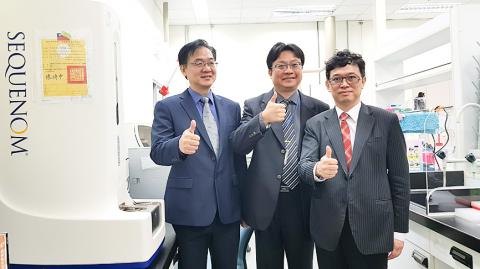National Taiwan University’s (NTU) pharmacogenomics laboratory has provided genetic testing to more than one-third of lung cancer patients receiving targeted treatment and generated revenue of nearly NT$400 million (US$13.11 million) over the past eight years, NTU medical biotechnology professor Yu Sung-liang (俞松良) said yesterday.
The NTU Department of Clinical Laboratory Sciences and Medical Biotechnology in 2011 established the laboratory to promote precision medicine and has since received about NT$500 million from the Ministry of Science and Technology, Yu told a news conference at the department in Taipei, where he lauded his team’s achievements over the past years.
The laboratory and Academia Sinica in 2017 joined the US-led Cancer Moonshot (now Cancer Breakthroughs) plan to carry out genome sequencing of lung and breast cancers.

Photo: Chien Hui-ju, Taipei Times
Over the past eight years, the laboratory provided genetic testing to more than one-third of lung cancer patients receiving epidermal growth factor receptor (EGFR) target therapy in Taiwan, he said.
It has produced more than 25,000 genetic testing reports for doctors to administer personalized therapies and disease prediction, Yu said.
Previously, people with lung cancer were likely to develop pneumothorax, or collapsed lung, and needed emergency care if physicians collected samples from their lungs, while samples collected from one tumor might be different from another tumor, he said.
To address the problem, the laboratory developed non-invasive testing methods, such as using a patient’s serum samples to screen for tumor DNA, Yu said.
The team is also helping domestic biotech companies to develop related instruments, he added.
Having taken part in the Ministry of Health and Welfare’s cancer screening program since 2014, his team also found that the risk factors for lung cancer patients in Taiwan vary significantly from those in the US and Europe, Yu said.
The laboratory generated service revenue of NT$389 million from 2011 to last year, while it has also attracted business investment up to NT$52 million, he said.
The laboratory in June stopped providing testing service for people undergoing EGFR therapy, as the health ministry in September included it in the National Health Insurance program, he said.

Taiwan is to have nine extended holidays next year, led by a nine-day Lunar New Year break, the Cabinet announced yesterday. The nine-day Lunar New Year holiday next year matches the length of this year’s holiday, which featured six extended holidays. The increase in extended holidays is due to the Act on the Implementation of Commemorative and Festival Holidays (紀念日及節日實施條例), which was passed early last month with support from the opposition Chinese Nationalist Party (KMT) and Taiwan People’s Party. Under the new act, the day before Lunar New Year’s Eve is also a national holiday, and Labor Day would no longer be limited

Taiwan is to extend its visa-waiver program for Philippine passport holders for another year, starting on Aug. 1, Minister of Foreign Affairs Lin Chia-lung (林佳龍) said on Friday. Lin made the announcement during a reception in Taipei marking the 127th anniversary of Philippine independence and the 50th anniversary of the establishment of the Manila Economic and Cultural Office (MECO) in Taiwan, the Ministry of Foreign Affairs said. The decision reflected Taiwan’s commitment to deepening exchanges with the Philippines, the statement cited Lin as saying, adding that it was a key partner under the New Southbound Policy launched in 2016. Lin also expressed hope

Costa Rica sent a group of intelligence officials to Taiwan for a short-term training program, the first time the Central American country has done so since the countries ended official diplomatic relations in 2007, a Costa Rican media outlet reported last week. Five officials from the Costa Rican Directorate of Intelligence and Security last month spent 23 days in Taipei undergoing a series of training sessions focused on national security, La Nacion reported on Friday, quoting unnamed sources. The Costa Rican government has not confirmed the report. The Chinese embassy in Costa Rica protested the news, saying in a statement issued the same

Temperatures in New Taipei City’s Sindian District (新店) climbed past 37°C yesterday, as the Central Weather Administration (CWA) issued heat alerts for 16 municipalities, warning the public of intense heat expected across Taiwan. The hottest location in Taiwan was in Sindian, where the mercury reached 37.5°C at about 2pm, according to CWA data. Taipei’s Shilin District (士林) recorded a temperature of 37.4°C at noon, Taitung County’s Jinfeng Township (金峰) at 12:50 pm logged a temperature of 37.4°C and Miaoli County’s Toufen Township (頭份) reached 36.7°C at 11:40am, the CWA said. The weather agency yesterday issued a yellow level information notice for Taipei, New